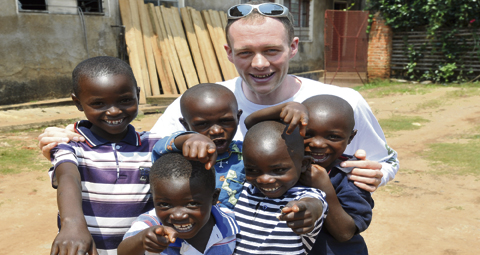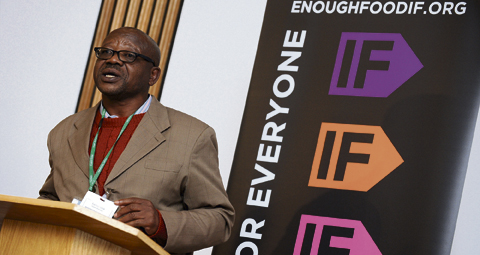BY Ian Dunn | March 29 | ![]() 0 COMMENTS
0 COMMENTS ![]() print
print

Golden Olympian and SCIAF team-up to help Burundi
— IAN DUNN talks to Paralympic athlete David Smith travelled to the troubled African nation on behalf of Scottish charity to help those living in poverty
For David Smith, winning a gold medal in London last year was only the beginning. His rowing triumph at the Paralympics was the culmination of a 19-year dream, but it also, ultimately, took him to Burundi to see some of the poorest people in the world, who are being helped by SCIAF.
Although born with a club foot, the Dunfermline native was determined to achieve sporting excellence and, after a journey that took him through karate, bobsleigh and a life threatening battle with cancer, he finally won gold at the Paralympics last summer. Prior to the Paralympics, He previously competed for Great Britain in able-bodied karate from 1993-1999 and bobsled from 2002-2008. In May 2009, during a routine MRI scan, a tumour close to the size of a tennis ball was found on his spine. Because he had been unknowingly living with the tumour for almost 10 years, the surgery didn’t leave him the same, despite the successful removal of the tumour. Even so, he embraced the sport of rowing, and won gold in the mixed fours event.
SCIAF ambassador
Not long after that, a friend of SCIAF’s approached him, asking if he would be interested in an ambassadorial role, which would involve visiting the charity’s projects in Burundi.
“To be honest, I had never heard of SCIAF before that point,” he recalled. “But I did some research and the charity sounded great, and it seemed like a great opportunity to raise awareness of the work they were doing.”
Although he agreed to go, the reality of being a gold medal winner at London took over and the planned trip took a back seat.
“It wasn’t until I arrived at Heathrow that it hit me what I had agreed to do,” he said. “And then, when we came out of the airport in Burundi and I saw all the guards with machine guns it really hit home.”
Despite the inauspicious start to his visit to one of the world’s poorest countries, he was incredibly impressed by the people he met there.
“They were very positive, it is the most welcome I have ever been made to feel,” he recalled. “I have never met such nice people, they really appreciate the work SCIAF are doing for them, and although they have been in bad situations, a second chance is all they ask for.”
Since gaining independence from Belgium in 1962, Burundi has been blighted by genocide and civil war. Conflict has claimed over half a million lives and more than one million people fled or were forced from their homes. For the last five years, however, there has been relative peace and people are returning to their villages. SCIAF has stepped up to help them rebuild their lives.
For Paralympian, the most impressive thing he discovered about the Burundians was how they had responded to that suffering.
“The extent to which people suffered was horrifying; every person I met each day had been through such overwhelming circumstances,” he reflected. “But it was also amazing the extent to which they were motivated to create a new life for themselves.”
SCIAF are helping with that process, and the most impressive project he saw during this visit was the Agakura Centre in Burundi. This agriculture centre helps people from troubled backgrounds become experts in modern agriculture.
“I was absolutely blown away by the work down there by Fr Deo (below) and others,” he said. “They take people who have had nothing, who have been at the bottom of the pipe and they train them and send them back to their communities where they teach other people about better ways of farming. It is so impressive.”
The whole trip was hugely inspiring to him. “It was a great honour to go out there and meet those people,” he said. “And an even better one to get to come back and tell other people about it.”
Golden opportunity
For Mr Smith, it has also proved that all those years going for gold have been worth it.
“The doors that have been opened by the gold medal are amazing,” he said.
“And so is the good that can be done with those opportunities.”
To that end, he is now planning on cycling around the world this year for charities, including SCIAF.
“It will be tough,” he laughed. “But it will be worth it.”
— For more information about David’s cycle challenge visit: www.360cc.co.uk
‘A role for everyone,’ says African priest rebuilding shattered nation
Burundi is the third poorest country on Earth. After decades of conflict, SCIAF is helping Burundians to rebuild their shattered nation.
Many arrive home to find the gardens they depend on for survival are being farmed by somebody else. Without land, they have nothing to eat. In already tense communities, where everyone is struggling to make ends meet, arguments over farmland can easily spill over into violence.
Fr Deo from the Agakura Centre in Burundi is one of SCIAF’s key partners in the country and recently visited Scotland to talk about the vital work he and SCIAF are doing in the country. He told the SCO that more than 90 per cent of people in Burundi are dependent on some form of local agriculture for survival.
“We work with young people who are homeless, living on the streets,” he said. “We teach them about sustainable agriculture and then they go back to their communities and tell others how they can improve their farming.”
Fr Deo said that the Agakura Centre currently has 700 students but before they can learn about agriculture they must learn about themselves.
“First we have to convince them that they can take control of their own lives,” he said. “The hand-out system is a killer; it makes people dependent. And many of the people we work with have been through terrible things.”
He explained that people in ‘bad places’ can and must be offered help.
“It is not so easy for young people: poverty leads to disputes,” he said. “And they think they want freedom but end up engaging in bizarre behaviour; they do anything, they become other than human but it is possible to rebuild and we help them to do that.”
Though many of those who attend Fr Deo’s school have no formal education, they are given advanced skills in agriculture.
“The big problem we have in Burundi is that there is not enough land and it is over exploited,” he said. “So we concentrate on methods that see the soil made more efficient and enriched rather than exploiting it.”
For Fr Deo, agriculture is in his bones.
“As a child I was known for always touching the soil,” he said. “I feel it is part of me. I have always worked with the soil. When I see the trees, I feel I must go among them, for amongst the trees I feel grace.”
He also believes that agriculture is a vital driver of human progress.
“Agriculture is mother of culture,” he said. “All the great breakthroughs in human civilisation have come from agriculture. All your supermarkets and skyscrapers; none of it is possible without agriculture.”
Whilst in Scotland, he has been taking this message far and wide, to schools around the country, as well as speaking at the Scottish Parliament.
When asked what his message has been at these places, he speaks simply.
“There is no such thing as human waste,” he said. “Anyone can be recycled. Everyone has a role to play












